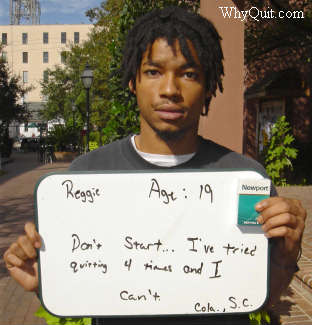Recall that in Chapter 12 we reviewed the following 8 relapse rationalizations, with the first 3 being detailed in Chapter 4.
- "Just one" or "just once."
- "I'm unable to concentrate."
- "Use relieves stress and anxiety."
- "I'm gaining too much weight."
- "I need relief from stress."
- "Withdrawal and my symptoms will never end!"
- "I'm mad that I can't smoke anymore."
- "I don't feel any better since stopping."
Why three different chapters? Why not just one? Because the moment we stop, every second beyond is about relapse prevention.
As soon as possible, at-risk newbies need awareness of the most common relapse justifications (the top 3 above). Chapter 12' takes aim at additional use justifications that can and do arise during the first few months. Here, we reflect on additional excuses that can occur at anytime, including the months and years ahead.
Let's get started.
While the relapsed addict may feel that their reason for relapse was sufficient, it won't explain the fact that they continued using.
They now need a new rationalization to explain why their relapse justification has passed, yet they haven't stopped.
This excuse dismisses or ignores having been successful up to the point of relapse. Obviously, they weren't too weak yesterday, or the day before, or the day before. Why now?
This user would benefit by focusing upon and breathing renewed life into their original dreams and desires. It highlights the importance of using a journal or diary to document them while still potent, clear, and fresh.
During their next recovery, they need to master not only putting but keeping those dreams in the driver's seat of their mind, especially during challenges. They'd be wise to revisit the crave coping techniques shared in Chapter 11 and prepare for battle by arming themselves with additional coping skills.
They need to appreciate that the growing pride they felt before they relapsed can take root anew in just a few hours, as they navigate withdrawal again, just one challenge at a time.
As Joel notes, chalking the attempt up to "experience" will mean absolutely nothing unless the user "objectively evaluates what caused his or her relapse."
"Instead of recognizing his past attempts as failures, he rationalizes a positive feeling of accomplishment about them. This type of rationalization all but assures failures in all future attempts."
He needs to understand that claimed use justifications never cause relapse. Administering another dose of nicotine is what causes relapse, not the circumstances surrounding it.
This addict justifies failure today by promising success in the future. But what if their now shattered dreams and desires never again become sufficient to motivate them to stop? What if there just isn't time?
What if continuing use causes fats and plaque building and gathering within an artery delivering oxygen to their brain to become fully blocked before arrival of the courage to again say "no"?
Once sufficiently re-motivated, why should they expect a different result if they still have little or no understanding as to why the last relapse occurred? If their motivations are sufficient now and they understand why they relapsed, what are they waiting for?
They're likely waiting because they've invented some new silly drug use rationalization as to why now just isn't the time.
Joel tells the story of a clinic participant named Barbara. "Barbara told me that she had once attended another clinic and liked it more than ours. I asked her how long she had stopped after that program and she said, 'Oh, I didn't stop at all.'"
"I then asked her how many of the other people succeeded. She replied, 'I don't know if anybody stopped.' I then asked, if nobody stopped then why did she like the program more? She answered, 'When I completed the program, I didn't feel bad about smoking!'"[4]
I often hear, "I've already tried cold turkey plenty of times!" What this person doesn't yet appreciate is that education - smart turkey - is a recovery method.
In contrast to uneducated abrupt nicotine cessation, it's like turning on the lights. Products and procedures clearly can fail to produce as advertised. But it's a little hard to blame knowledge and understanding when our actions are contrary to them.
Like the public library, knowledge cannot take credit for being used, nor blame for being ignored. Unlike products, this book can never claim credit for having endured a single challenge for any reader.
Credit for their ongoing victory will always be 100 percent theirs. Likewise, responsibility for allowing nicotine back into their bloodstream and brain is totally theirs too.

It isn't that this person is different. In fact, they're the same as us. Relapse after relapse, with at least a dozen serious failed attempts of my own, I eventually came to believe that it was impossible for me to stop.
After one last failed attempt in early 1999, I surrendered to the fact that I was a drug addict, that stopping was hopeless, and that I would die an addict's death.
What I didn't then realize was that each of those battles was fought in ignorance and darkness. I was swinging blindly at an unseen opponent.
What I didn't realize was that I'd never once brought my greatest weapon to the battlefield, my intelligence.
I'd made recovery vastly more challenging than need be. I skipped meals, added hunger anxieties, mind fog, experienced caffeine doubling associated with at least a pot of coffee daily, and leaned heavily upon others for support.
Insanely, more than once I celebrated and rewarded myself with just one cigarette after three days, once the early anxieties began easing off a bit. I knew nothing of the body's abilities to rid itself of nicotine.
And having inter-spaced cold turkey with at least four NRT attempts, I was totally lost. Was nicotine medicine or was it what was keeping me hooked? How could I possibly self-discover the Law of Addiction via one puff and relapse when being taught that nicotine was medicine?
Was I weaker than the hundreds of millions who had successfully stopped? Was I different?
Certainly not with respect to what happens once nicotine enters the brain. As Joel notes, it is impossible to locate any person who relapsed who didn't introduce nicotine back into their bloodstream.
More Excuses Coming
As far as relapse excuses are concerned, life will provide an abundant supply for anyone looking for them. We will have friends or loved ones who will get sick, diseased and die.
Dying is a normal part of life. If the death of someone close to us is an acceptable reason for relapse then the freedom and healing of nearly a billion now comfortable ex-users is at risk.
Expect imperfect humans to do the unthinkable. We change, disagree, sometimes break promises, argue, and start and end relationships. Expect financial distress as food, medicine, fuel and living costs continue to rise. The loss of a job or inability to work may only be an injury, disease or pink slip away.
Floods, droughts, fires, tornadoes, earthquakes, and hurricanes will happen. People die, vehicles collide, sports teams lose, terrorists attack, and wars will be waged, won, and lost. Life promises loads of excuses to relapse.
But freedom's promise is absolute. It is impossible to relapse so long as all nicotine remains on the outside.

We each have a 100 percent guarantee of staying free today so long as no nicotine gets inside.
References:
2. Spitzer, J, "Well, at least I attempted to quit. That is better than not trying at all," WhyQuit.com, Joel's Library, 1986. Note: references to the word quit have been replaced with the word stop or stopped.
3. Spitzer, J, "I know I will quit again," February 22, 2001, https://whyquit.com/joels-videos/i-know-i-will-quit-again/
4. Spitzer, J, "I've tried everything to quit and nothing works," February 16, 2002, https://whyquit.com/joels-videos/ive-tried-everything-to-quit-smoking-and-nothing-works/
5. Spitzer, J, "Maybe I'm Different" WhyQuit.com, Joel's Library, 1985.
6. Spitzer, J, I Can't Quit or I Won't Quit, WhyQuit.com, Joel's Library, 1986.
All rights reserved
Published in the USA
